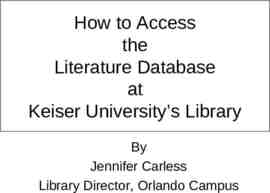Enterprise Java Beans Ye Zhou CS6704 Presentation Virginia Tech
20 Slides396.00 KB
Enterprise Java Beans Ye Zhou CS6704 Presentation Virginia Tech
Entity Beans An in-memory Java representation of persistent data -- a view into a database Long-lived – as long as data lives Shared access from multiple users Transactional Can survive from the server crash
Entity Bean Model Entity Bean class ejbLoad() – load state from underlying DB ejbStore() – synchronize the state regularly ejbRemove() – remove object when client calls ejbActivate() – bean instance out of pool ejbPassivate() – bean instance disassociated setEntityContext() – called by container on creation unsetEntityContext() – called by container before being removed Primary Key class Unique Identifier
Entity Bean usage
BMP & CMP BMP an entity bean that synchronizes its state with the database manually CMP – Bean Managed Persistence – Container Managed Persistence EJB container will do it instead
BMP & CMP
Entity bean example
Entity bean example import javax.ejb.*; import java.rmi.remoteException; public interface AccountHome extends EJBHome{ Account create(String accountID, String ownerName) throws CreateException, AccountException; public Account findByPrimaryKey(AccountPK key) throws FinderException, RemoteException; public Collection findByOwnerName(String name) throws FinderException, RemoteException; public double getTotalBankValue() throws RemoteException, AccountException; }
Entity bean example import java.io.Serializable; public class AccountPK implements java.io.Serializable{ public String accountID; public AccountPK(String id){ this.accountID id; } public String toString() { return accountID: } public boolean equals(Object account){ return ((AccountPK)account).accountID.equals(accountID); } }
Entity bean example public class AccountBean implements EntityBean{ protected EntityBeanContext ctx; private String accountID; //primary key private String ownerName; private double balance; //getter & setter on fields public setXXX(String value) public String getXXX()
Entity bean example //Business Logic methods public void Deposit(double amt) throws AccountException { balance amt; } public void WithDraw(double amt) throws AccountException { if(amt balance) { throw new AccountException(accountID “Limit reached”); } else balance- amt; }
Entity bean example //EJB required methods public void ejbLoad() { AccountPK account (AccountPK) ctx.getPrimaryKey(); String id account.toString(); PreparedStatement ps null; Connection con null; try{ con getConnection(); ps con.preparedStatement(“select owner, balance from accounts where id ?”); ps.setString(1,id); ResultSet rs ps.executeQuery(); rs.next(); ownerName rs.getString(1); balance rs.getDouble(2); }catch(Exception e){throw new EJBException(“Fail to load from DB”);} }
Message-Driven Bean Motivation Performance: Reliability: RMI-IIOP is a blocking protocol RMI-IIOP can’t survive from the server failure Multiple senders and receivers: RMI-IIOP is connection-oriented, which is not possible for clients to broadcast the events to servers.
Message-Driven Bean Definition A special EJB component that can receive JMS messages.
Message-Driven Bean Life cycle
Message-Driven Bean Characteristics No home interface, local home interface and remote interface It has a single, weakly-couple typed business method “OnMessage” No return values Stateless Do not send Exception back to clients Subscription can be durable or non-durable
Message-Driven Bean example import javax.ejb.*; import javax.jms.*; public sampleBean implements MessageDrivenBean, MessageListener { protected MessageDrivenContext ctx; public void setMessageDrivenContext(MessageDrivenContext ctx) {this.ctx ctx;} public void ejbCreate() {System.err.println(“bean initialized”);}
Message-Driven Bean example public void onMessage(Message msg) { if(msg instanceOf TextMessage) { TextMessage tm (TextMessage)msg; try{ String text tm.getText(); System.err.println(“Text is” text); }catch(JMSException e) { e.printStackTrace(); } } } public void ejbRemove() { System.err.println(“bean removed”);} }
Transaction Features ACID Types Programmatic Declarative Client-initiated Package Javax.transaction.*
Reference Ed Roman, “Mastering Enterprise Javabeans ”, John Wiley & Sons Inc., 2002 Linda DeMichiel, “Enterprise Javabeans Spec V2.0”, Sun Microsystem, 2001 Gopalan Raj,http://www.execpc.com/ gopalan/java/ejb.html







